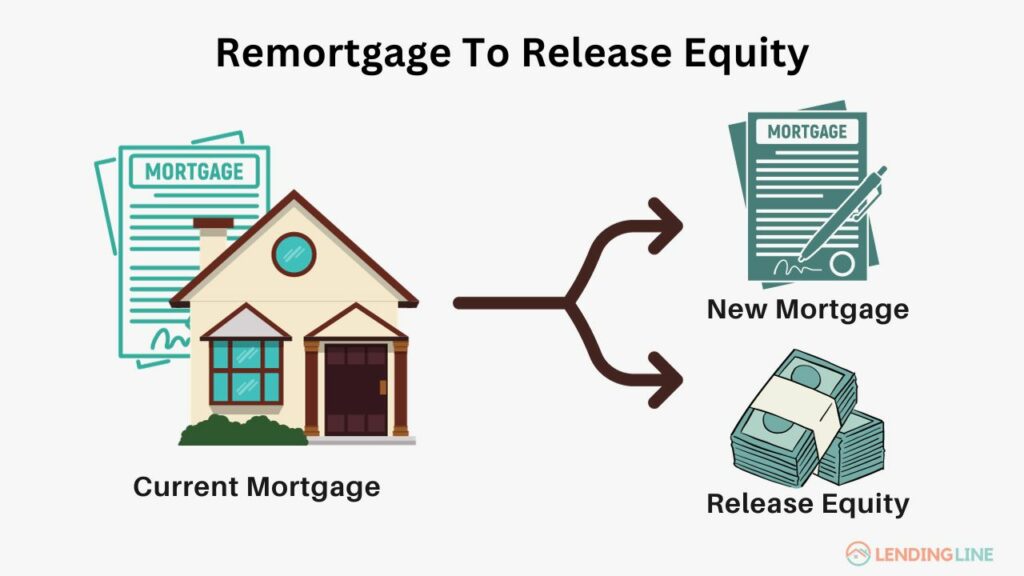Of late, property prices for the most part have seen an upswing, with reports indicating a 0.6% increase in the average house price in the UK compared to last year. And if history is anything to go by, house prices are likely to continue to increase over the years.
This also means that the equity homeowners hold in their properties – the amount remaining after repaying the mortgage will increase also.
As such, your home can serve as a valuable source of cash, and you can remortgage to release equity when in need of extra funds.
Read on to know how remortgaging helps release equity from your home, especially after a fixed-rate period ends.
Please note, for the purposes of this article we are outlining equity release/capital raising through remortgaging rather than equity release schemes or home reversion plans aimed at older borrowers.

Table of Contents
- How Does Remortgage To Release Equity/Capital Raising Works?
- Pros Of Remortgaging To Release Equity/Capital Raising
- Cons Of Remortgaging To Release Equity/Capital Raising
- Where Can You Use The Funds Obtained From Releasing Equity/Capital Raising
- How Much Equity Can You Release?
- Can You Remortgage With A Poor Credit History?
- What Will Happen To Your Mortgage Repayments?
- Alternatives To Remortgage with Release Equity/Capital Raising
- To Sum Up
How Does Remortgage To Release Equity/Capital Raising Works?
Remortgaging to release equity involves refinancing your existing mortgage with a new one, usually at a higher loan amount. Here’s how it works:
1. Assessment
Start by assessing your current home value and the outstanding mortgage balance. The difference between these two figures represents your available equity.
2. Lender Approval
Contact your current mortgage lender or explore new lenders to find a remortgage deal that suits your needs. Lenders will assess your creditworthiness and ability to repay the new, larger mortgage.
If you retain your current lender, the process of remortgaging is known typically as a “product transfer.” On the other hand, obtaining additional funds from the same lender is referred to as a “further advance.”
3. Property Valuation
A professional valuation of your property is often required to determine its current market value accurately.
4. Equity Release/Capital Raising
You can remortgage for a higher amount than your existing mortgage balance. The additional funds constitute the released equity.
5. Repayment Terms
The new mortgage terms, including interest rates and repayment schedules, will be determined by the lender. It’s essential to understand these terms thoroughly.
6. Legal Process
Legal processes, such as conveyancing, will be involved in switching your mortgage. This ensures the property’s legal transfer and adherence to regulations. The legal process will likely be less so if you are completing a product transfer & further advance.
7. Costs
Be aware of costs associated with remortgaging, including arrangement fees, legal fees, and valuation fees. These can affect the overall financial benefit.
8. Usage
Equity released through remortgaging can be used for various purposes, such as home improvements, debt consolidation, investments, or supplementing retirement income. Different lenders will have different criteria on the purpose in which they accept.
9. Repayment
You’ll repay the new mortgage, including any additional borrowing, over an agreed-upon period. Keep in mind that interest rates/mortgage terms will likely differ from your previous mortgage.
10. Financial Advice
Seeking advice from a financial advisor or mortgage broker can help you navigate the process and find the best deal for your circumstances. As such, before proceeding, it’s crucial to carefully consider the implications and assess whether remortgaging to release equity aligns with your financial goals and circumstances.
Also, remember that when you opt for remortgaging to release equity, you’re essentially securing a loan based on your home’s value.
Even if you’re within a lower Loan-to-Value (LTV) ratio, you’ll be taking on a larger mortgage, which could lead to higher monthly repayments.
Pros Of Remortgaging To Release Equity/Capital Raising
- Utilise the cash for various purposes, such as covering university fees, providing a gifted deposit, or funding home improvements
- Access money that would otherwise be tied up in your property
- May not significantly alter your Loan-to-Value (LTV) ratio if you have a substantial amount of equity
Cons Of Remortgaging To Release Equity/Capital Raising
- Proceeding without financial advice may harm your credit score and decrease your chances of approval if an application gets rejected.
- May face significant Early Repayment Charges, possibly up to 5%, if you are currently within certain mortgage products.
- Falling house prices can result in negative equity, where your outstanding mortgage exceeds your home’s value. Increasing your LTV by releasing equity increases this possibility.
- Inability to afford repayments which are likely to be higher may lead to the risk of home repossession
- Could be more expensive than obtaining a personal loan, particularly due to longer repayment periods
- Remortgaging may extend the duration of your mortgage, resulting in paying back more over time
- Taking on a larger mortgage often results in increased monthly repayments
Where Can You Use The Funds Obtained From Releasing Equity/Capital Raising

Different lenders will have different criteria on what the released funds can be used for, most homeowners often direct them towards home improvements or consolidating existing debts.
It’s also common to consider financing endeavours like starting a business or covering educational expenses, once again this will be lender dependent.
In some cases, particularly older homeowners with substantial home equity, these funds may be used to assist family members, such as helping children enter the property market.
Be aware that your lender will require you to disclose your intended use of the funds and provide additional documentation, like a quote for a home renovation project for example.
How Much Equity Can You Release?
The amount of equity you can release via remortgaging depends on multiple factors – your current home equity, property value, remaining mortgage term, and age. Lenders also consider your income, affordability, and credit rating.
As such, older borrowers may have to deal with stricter terms and a smaller pool of lenders. Nevertheless, we recommend checking online remortgage calculators on lender and broker websites and then consulting a mortgage broker for better understanding.
Also, keep in mind that the remortgaging application procedure may span several months, so ensure you allocate ample time before requiring the funds.
Can You Remortgage With A Poor Credit History?
It is important to recognise that with a bad credit report, you might not qualify for the most favourable remortgage offers. Although remortgaging is not impossible, you may have to face higher interest rates.
In such cases, it’s advisable to explore options with an independent mortgage broker and carefully assess the possibilities and repercussions of additional borrowing.
What Will Happen To Your Mortgage Repayments?
When increasing your mortgage balance, your monthly payments will generally increase unless you extend the mortgage term. However, securing a remortgage deal with a lower interest rate can help mitigate the impact.
The interest rate you qualify for is determined by your loan-to-value (LTV) ratio, expressed as a percentage comparing the mortgage value to the property’s worth. Consequently, a lower LTV results in a more favourable interest rate.
For example, if you have 30% equity, you can remortgage with a 70% LTV loan. Yet, if releasing equity pushes the LTV to 80%, expect higher interest rates. Conversely, if you have more equity, releasing equity may not significantly affect the LTV or interest rate.
Generally, the most competitive interest rates are offered to borrowers in the 60-65% LTV range.
Alternatives To Remortgage with Release Equity/Capital Raising
Besides remortgaging, you can try the following methods to raise cash. Check them out-
1. Lifetime Mortgage
A lifetime mortgage lets you access funds that do not require repayment until your home is sold, typically when the last homeowner passes away or enters long-term care.
Hence, this type of equity release mortgage is suitable for older homeowners (aged 55+). Schemes such as this should be explored with caution.
2. Joint Borrower Sole Proprietor
If you want to assist a family member in buying a home, a joint borrower sole proprietor mortgage considers both incomes, potentially allowing them to borrow more. This might be an alternative to capital raising and then giving an increased gifted deposit.
3. Money Transfer Credit Card
For smaller amounts, a money transfer credit card can be used to transfer funds. Some cards offer 0% interest for a specified period, but it is crucial to pay off the entire balance before the 0% period ends to avoid high-interest charges evidently with this method.
This could be an alternative to look at if you are looking to remortgage to release equity for debt consolidation.
4. Personal Loan
While personal loan interest rates are typically higher, they come with shorter repayment periods, potentially making them a cost-effective alternative to remortgage.
Depending on your circumstances, you can borrow up to £25,000, and funds can be transferred within one to two days.
5. Further Advance From Your Existing Lender
You can also contact your current mortgage provider to explore the possibility of borrowing more at either your current mortgage rate or a competitive rate.
This approach allows you to bypass early repayment charges and the legal process associated with switching providers, making it a faster and potentially more cost-effective option.
That said, you must be prepared for an affordability check by your mortgage provider before they extend additional funds.
To Sum Up
So, you see, remortgaging to release equity can be a viable financial strategy, allowing homeowners to tap into the value of their property.
However, it’s essential to consider the implications and explore alternatives carefully. Factors such as interest rates, repayment terms, and affordability assessments should be thoroughly assessed before applying for remortgage.
Additionally, the potential for higher monthly payments and extended repayment periods must be weighed against the benefits of accessing cash.
Hence, we highly recommend consulting mortgage brokers or financial experts to make well-informed decisions and meet your financial goals.
Your home may be repossessed if you do not keep up repayments on your mortgage.
All content is written by qualified mortgage advisors to provide current, reliable and accurate mortgage information. The information on this website is not specific for each individual reader and therefore does not constitute financial advice.
Our goal is simple - to provide most up-to-date and accurate mortgage information to make your mortgage journey as stress-free as possible. Have a question? Fill up the quick form and one of our mortgage advisor will connect with you.








